Photo

A shy fiend. Do you know a Goblin in your life?
#goblin#gobwin#cat's cafe#wholesome#wholesomememes#treasure#comic#comics#webcomic#webtoon#goblin gift#gift
7K notes
·
View notes
Photo
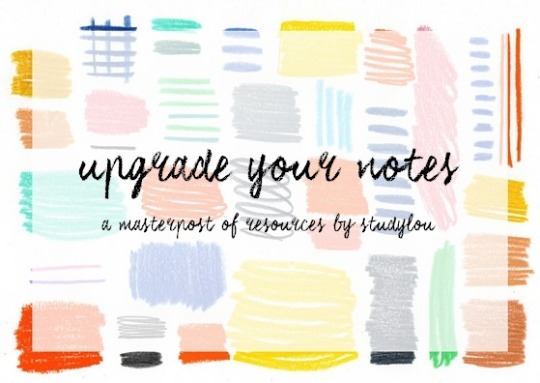
hi everyone! since the holidays are over for most of us, i thought i’d make an inspirational and motivational masterpost all about notes! upgrading your notes by changing the layout, adding doodles, banners, using sticky notes, changing your handwriting etc. motivates me personally to study!
out with the sloppy last minute notes and in with the new!
handwriting
how to write in cursive
some fonts to try out
how to improve your handwriting
note taking systems
study methods summed up
stationery to make it all happen
sticker printables to jazz it up
notes
how to take lecture notes
how to annotate books
taking notes from a textbook - studyign
note taking system - theorganisedstudent
note taking system - emmastudies
another note taking system - academicmind
another note taking system - wonderfullifee
the 2 notebook method
note taking with highlighters and post its
pretty timelines
note taking printables
plot summary with sticky notes
20 uses of sticky notes
colour code your notes
method with columns
the cornell note taking system
the cornell note taking system using onenote
in class notes
another in class note taking format
what are sketchnotes?
online whiteboard
flashcards
how to make flashcards
another how to make flashcards
an example
another example (with sticky notes)
and another example (biology)
8 ways to improve your flashcards
make and test flashcards online
alternative to flashcards - studyign
print onto flashcards
mindmaps
how to mindmap (1)
how to mindmap (2)
some examples
apps
notability
banners
simple banner
more banners
it’s a banner party over here
banners (shown how to draw in gifs)
illustrate your notes
how to illustrate your notes - reviseordie
sketchnote tips (banners, lettering, doodles)
more sketchnote tips
even more sketchnote tips
how to make your notes pretty - theorganisedstudent
how to make your notes pretty - studyspoinspo
how to make your notes pretty - booksflowersandtea
what is visual note taking?
a visual alphabet
note taking printables
dot grid
note outline printables
lined cornell method printable
grid cornell method printable
hope you all had a good rest and are ready for a new year of studying!
xoxo lou
39K notes
·
View notes
Text
Words to describe facial expressions
Absent: preoccupied
Agonized: as if in pain or tormented
Alluring: attractive, in the sense of arousing desire
Appealing: attractive, in the sense of encouraging goodwill and/or interest
Beatific: blissful
Black: angry or sad, or hostile
Bleak: hopeless
Blinking: surprise, or lack of concern
Blithe: carefree, lighthearted, or heedlessly indifferent
Brooding: anxious and gloomy
Bug eyed: frightened or surprised
Chagrined: humiliated or disappointed
Cheeky: cocky, insolent
Cheerless: sad
Choleric: hot-tempered, irate
Darkly: with depressed or malevolent feelings
Deadpan: expressionless, to conceal emotion or heighten humor
Despondent: depressed or discouraged
Doleful: sad or afflicted
Dour: stern or obstinate
Dreamy: distracted by daydreaming or fantasizing
Ecstatic: delighted or entranced
Faint: cowardly, weak, or barely perceptible
Fixed: concentrated or immobile
Gazing: staring intently
Glancing: staring briefly as if curious but evasive
Glazed: expressionless due to fatigue or confusion
Grim: fatalistic or pessimistic
Grave: serious, expressing emotion due to loss or sadness
Haunted: frightened, worried, or guilty
Hopeless: depressed by a lack of encouragement or optimism
Hostile: aggressively angry, intimidating, or resistant
Hunted: tense as if worried about pursuit
Jeering: insulting or mocking
Languid: lazy or weak
Leering: sexually suggestive
Mild: easygoing
Mischievous: annoyingly or maliciously playful
Pained: affected with discomfort or pain
Peering: with curiosity or suspicion
Peeved: annoyed
Pleading: seeking apology or assistance
Quizzical: questioning or confused
Radiant: bright, happy
Sanguine: bloodthirsty, confident
Sardonic: mocking
Sour: unpleasant
Sullen: resentful
Vacant: blank or stupid looking
Wan: pale, sickly
Wary: cautious or cunning
Wide eyed: frightened or surprised
Withering: devastating
Wrathful: indignant or vengeful
Wry: twisted or crooked to express cleverness or a dark or ironic feeling
104K notes
·
View notes
Text
Words to describe facial expressions
Absent: preoccupied
Agonized: as if in pain or tormented
Alluring: attractive, in the sense of arousing desire
Appealing: attractive, in the sense of encouraging goodwill and/or interest
Beatific: blissful
Black: angry or sad, or hostile
Bleak: hopeless
Blinking: surprise, or lack of concern
Blithe: carefree, lighthearted, or heedlessly indifferent
Brooding: anxious and gloomy
Bug eyed: frightened or surprised
Chagrined: humiliated or disappointed
Cheeky: cocky, insolent
Cheerless: sad
Choleric: hot-tempered, irate
Darkly: with depressed or malevolent feelings
Deadpan: expressionless, to conceal emotion or heighten humor
Despondent: depressed or discouraged
Doleful: sad or afflicted
Dour: stern or obstinate
Dreamy: distracted by daydreaming or fantasizing
Ecstatic: delighted or entranced
Faint: cowardly, weak, or barely perceptible
Fixed: concentrated or immobile
Gazing: staring intently
Glancing: staring briefly as if curious but evasive
Glazed: expressionless due to fatigue or confusion
Grim: fatalistic or pessimistic
Grave: serious, expressing emotion due to loss or sadness
Haunted: frightened, worried, or guilty
Hopeless: depressed by a lack of encouragement or optimism
Hostile: aggressively angry, intimidating, or resistant
Hunted: tense as if worried about pursuit
Jeering: insulting or mocking
Languid: lazy or weak
Leering: sexually suggestive
Mild: easygoing
Mischievous: annoyingly or maliciously playful
Pained: affected with discomfort or pain
Peering: with curiosity or suspicion
Peeved: annoyed
Pleading: seeking apology or assistance
Quizzical: questioning or confused
Radiant: bright, happy
Sanguine: bloodthirsty, confident
Sardonic: mocking
Sour: unpleasant
Sullen: resentful
Vacant: blank or stupid looking
Wan: pale, sickly
Wary: cautious or cunning
Wide eyed: frightened or surprised
Withering: devastating
Wrathful: indignant or vengeful
Wry: twisted or crooked to express cleverness or a dark or ironic feeling
104K notes
·
View notes
Text
22 Science-Backed Study Tips to Ace a Test
‘Tis the season! I found this article while trying to muster up some motivation to study for finals. It was really helpful to me and I thought that maybe some tumblr friends might benefit from it too! Good luck with finals everyone! I believe in you!
Remember Your Stuff
1. Study when sleepy.
Bedtime stories are for wimps. Instead of reading The Berenstein Bears, try studying for a few minutes right before hitting the hay. During sleep, the brain strengthens new memories, so there’s a good chance we’ll remember whatever we review right before dozing off . (Just try not to bring work into the actual bed, since it can make it harder to get a good night’s sleep.) And though bedtime is primo study time, it might also help to crack open the books after cracking open those eyes in the A.M.—in the morning, the brain still has lots of room to absorb new information.
2. Space it out.
A relatively new learning technique called “spaced repetition” involves breaking up information into small chunks and reviewing them consistently over a long period of time. So don’t try to memorize the entire periodic table in one sitting—instead, learn a few rows every day and review each lesson before starting anything new.
3. Tell a tale.
Turning the details you need to remember into a crazy story helps make the information more meaningful. For example, remember the order of mathematic operations PEMDAS this way: Philip (P) wanted to eat (E) his friend Mary (M) but he died (D) from arsenic (AS) poisoning.
4. Move your butt.
Research suggests studying the same stuff in a different place every day makes us less likely to forget that information. That’s because, every time we move around (from the library to the coffee shop, or the coffee shop to the toilet seat), we force the brain to form new associations with the same material so it becomes a stronger memory.
5. Switch it up.
Don’t stick to one topic; instead, study a bunch of different material in one sitting. This technique helps prepare us to use the right strategy for finding the solution to a problem. For example, doing a bunch of division problems in a row means every time we approach a problem, we know it’ll require some division. But doing a series of problems that require multiplication, division, or addition means we have to stop and think about which strategy is best.
6. Put yourself to the test.
Quizzing ourselves may be one of the best ways to prepare for the real deal. And don’t worry about breaking a sweat while trying to remember the name of the 37th U.S. president (fyi, it’s Nixon): The harder it is to remember a piece of information in practice mode, the more likely we are to remember it in the future.
7. Write it out.
Put those third-grade penmanship lessons to good use. Research suggests we store information more securely when we write it out by hand than when we type it. Start by recopying the most important notes from the semester onto a new sheet of paper.
8. Make me wanna shout.
Reading information out loud means mentally storing it in two ways: seeing it and hearing it . We just can’t guarantee you won’t get thrown out of the library.
Stay Focused
9. Come together (right now).
Group work doesn’t fly with everyone, but for those who benefit from a little team effort, a study group’s the way to go. Pick a few studious pals and get together every few days to review the material. Put one person in charge of delegating tasks (snack duty, music selection) and keeping the group on target with its goals.
10. Treat yo’ self! A healthy holiday cookie, a walk around the block, five minutes of tweet-time: whatever floats your boat. Knowing there’s a little reward waiting for us at the end of just a few pages makes it easier to beat procrastination while slogging through a semester’s worth of notes.
11. Drink up.
Sorry, not that kind of drink. Instead, hit the local coffee shop for something caffeine-filled; there’s lots of research suggesting coffee (and tea) keeps us alert, especially when nothing seems more exciting than the shiny gum wrapper on the library floor .
12. Take a time out.
Taking time to plan is one of the most important skills a student can have. Don’t just start the week with the vague goal of studying for a history exam—instead, break up that goal into smaller tasks. Pencil it in on the calendar like a regular class: For example, allot every day from 1 to 3 p.m. to review 50 years’ worth of info.
13. Gimme a break.
The KitKat guys said it, and so does science: Taking regular breaks can boost productivity and improve our ability to focus on a single task . For a real productivity boost, step away from the screen and break a sweat during a midday gym sesh.
14. Work it out.
Get stronger and brainier at the same time. Research has found just half an hour of aerobic exercise can improve our brain-processing speed and other important cognitive abilities. Jog a few laps around the block and see if you don’t come back with a few more IQ points.
15. Daaaance to the music.
As anyone who’s ever relied on Rihanna to make it through an all-night study session knows, music can help beat stress. And while everyone’s got a different tune preference, classical music in particular has been shown to reduce anxiety and tension. So give those biology notes a soundtrack and feel at least some of the stress slide away.
16. Nix the ’net.
We’ve all been there, facing the siren call of a friend’s Facebook wall on the eve of a giant exam. If a computer’s necessary for studying, try an app (such as this one) that blocks the Internet for a short period of time and see how much more you get done.
17. Say om.
Just before staring at a piece of paper for three hours, stare at a wall for three minutes. Research suggests meditation can reduce anxiety and boost attention span. While those studies focus mostly on regular meditation, there’s no harm in trying it out for a few minutes to calm pre-test jitters .
18. Doze off.
When there’s a textbook full of equations to memorize, it can be tempting to stay up all night committing them to memory (or trying to). But all-nighters rarely lead to an automatic A—in fact, they’ve been linked to impaired cognitive performance and greater sensitivity to stress . In the days leading up to a big exam, aim to get those seven to nine hours a night so sleep deprivation doesn’t undo all the hard work you’ve put in.
19. Own the Omegas.
Omega-3 fatty acids, found in certain fish, nuts, and olive oil, are known for their brain-boosting potential. One study found that eating a combination of Omega-3-and Omega-6 fatty acids before an exam actually reduced test anxiety .
20. Feel free to inhale.
Dusty old library again… or spa day? Research has found that catching a whiff of essential oils (like rosemary or lavender) can help calm students down before a big exam . Skip the frantic last-minute review and try a few minutes of aromatherapy instead.
21. Practice your brain pose.
Hardcore yogis tend to have better cognitive abilities—especially attention span—than folks less familiar with Down Dog . A few daily sun salutations may be all it takes to keep centered during finals period.
22. Learn what works.
Some people are early birds; some are night owls; some prefer to study with a pal; others need complete and total silence. Experiment to find what’s most effective for you, and then stick with it!
Source: [x]
4K notes
·
View notes
Photo
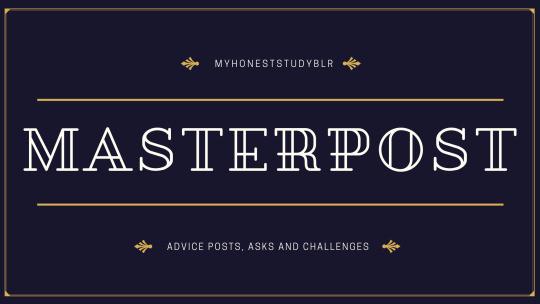
This is a post where you can find all of my advice and asks very easily, all in one place, so you don’t need to search through the tags. My ask box is always open and I will try my best to answer as fully as possible and help you out. I will update this post with posts as I do them.
My Ask Box is always open if you want advice or support.
Find me on Instagram as @/myhoneststudyblr

How To Start A Studyblr
this is one of my most commonly asked questions so here is a really long post where i give you all of my tips on how to start a studyblr and also get involved in the community
How I Edit My Studyblr Pictures
i go through exactly how i edit my studyblr pictures using snapseed to make it bright and white but still have the colours pop!
How To Stop Procrastinating
in this post, i give you some of my tips for how to stop procrastinating and get productive. i include both some conventional tips but also some unconventional ones that you can try out.
How To Study When You Really Don’t Want To
sometimes studying can be really difficult, particularly if you have no motivation to do so. therefore in this post i give a selection of different tips to try and help you get to work even when that is the last thing you want to do
7 Strategies to Improve Concentration
Do you sometimes realise that your mind is wandering only 10 or 15 minutes after sitting down to work? Do you often read the same page repeatedly without remembering any of it? Try these strategies to monitor and improve your concentration!
7 Strategies to Manage Distractions
As a student, distractions are all around us and they can really effect our productivity! So I hope that this post will help you find out how to recognise distractions and also give you strategies to manage various different types for more effective studying!
Common Study Mistakes
No student is perfect and it is really easy to fall into bad habits. These tips will hopefully help you recognise the problem and give you solutions so that you work smarter, not harder. They will help you study efficiently and save yourself from burnout.
How to Focus in Online Classes
i know a lot of people still have online classes so i wanted to give some tips that i’ve learnt from experience on how to focus and make sure that you are getting the most from online classes.
How To Do Uni Readings
in this post, i give advice on how to tackle lots of academic reading for university. i cover reading goals, selection, active reading and different reading techniques! also see here for the additions from @bulletnotestudies for med specific tips
Active Revision Techniques
in this post, i explain: active revision and the questions you need to ask yourself to deepen your understanding. i also outline some of the best techniques to make sure you are revising actively!
The OSCAR Revision Model
The OCSAR Model is designed to help you tackle questions that need interpretation, discussion and analysis. This tactic is designed to improve your subject understanding and ability to apply what you learn to new contexts.
How To Revise Big Subjects
this post gives you step by step tips on what to do when you are revising for subjects with lots of content to cover, from the very initial steps to the hours before the exam
Study Hacks to Improve Your Memory
As a student, you probably have to memorise a lot of stuff. Of course, revising actively is always best but sometimes lots of memorisation is necessary for tests and exams. These study hacks will help you boost your memory for learning information before an exam!
How To Study Languages
a post for everyone who wants to start learning a language but doesn’t know how to. these tips are some of the most important tips and strategies you need to do to develop your language skills (not related to a specific language)
Why You Need to Forget About Learning Styles
If you have spent any time in the studygram community, you are bound to have heard of the ‘learning styles’ theory. However, attempting to just learn through one ‘learning style’ has been proven to be ineffective despite becoming part of a popular myth. In this post, I explain why and look at whether we can still use them!
The Diffuse Mode of Thinking
I think a lot of people know this partially but have never actually seen it explained fully so I hope that this post will help you understand why this is such an important concept for learning and studying to really create something valuable and balance out focused time
Top 10 Tips to Boost Motivation
in this post, i share 10 tips that can help you increase your motivation for studying, both some practical things and tips more to do with mindset
Unusual Study Tips
there are a million and one study tips posts so in this one i try to give some ones you might not have heard before in order to give you some new ideas to boost your studying!
Why You Need to Think Like a 4 Year Old
4 year olds know where it’s at with learning! We could learn so much from their natural curiosity and hopefully this post will tell you how!
How I Use Google Docs To Take Notes
i got asked how i use google docs as part of my notetaking system and so in this post i explain what i like and dislike, about google docs templates and my overall notetaking system: cascading bullet points
How To Annotate
i give you all of my best tips for annotating - both in general and more specifically for literature (novels, plays and poetry) - from my own experiences and some research
Google Search Codes
in this post, i list some of the most useful google search codes because i know that google is often the first step for people when researching.
How To Sleep
so many students struggle with sleep which is so bad because it is so important to help boost studying. therefore, in this post, i outline all the best - and proven - tips to help you sleep better
The Complete Guide to the British Education System
this post is a detailed, in depth explanation of the the British school system, from primary school to university. i explain the differences between private and state schools and between the different UK nations.
My Experiences With GCSEs
in this post i talk about what i did to revise for the first external exams i’ve done. even though the title sounds very specific, it mostly gives all my advice on revision techniques and preparing for exams.
The Best Apps for Students
as the name suggest, in this post i give some of my favourite apps for students and the ones that i use all the time
List of Essay Questions for Foreign Languages (for Beginners)
this was answer to an ask but i think it deserves to be in this section. basically i give a bunch of questions separated into different categories that could be used to build an essay or just as writing practice for beginners in a foreign language. they are all given in english but they can be easily translated.
My Favourite Pens (2019)
i am a huge stationery lover so in this post (which was my very first big post) i give some of my absolute favourites

My Study Routine during Exam Season
Tips for Staying Focused (with ADHD)
Motivation/Discipline tips
Talking about My Motivation
Tips for When You Are Feeling Overworked or Anxious and How Keep Up with Your Work
Tips for When You are Having a Rough Day
Tips for Taking Studyblr Pictures
My A Levels and How Hard They Are
Tips for Starting a Studyblr and How to Get Involved in the Community: [Ask 1] [Ask 2]
How to Make Friends on Studyblr [Ask 1] [Ask 2]
Tips for Doing Languages at A Level
Books, Films and TV Shows to Practice German
Motivation for Posting

2020 Quarantine Challenge : March - July 2020
Summer Studying Challenge: July - September 2020
The Studyblr Community Challenge: Can be done at any time
Winter Studying Challenge: December - January 2020/21

In this section, you can find links and discount codes for various brand partnerships that I have.
For those marked with [*], I will receive a small commission if you use my discount code.
Check out Speechify to be more productive! [paid partnership]
Use MYHONESTSTUDY10 and Get 10% Off Any Purchase on the MyPaperPanda Shop [*]
Use MYHONESTSTUDYBLR15 to Get 15% Off Any Purchase on the Tired Tuesday Store [*]
Use myhoneststudyblr25 to Get 25% Off Any Purchase on the Äestheticgirly Website [*]
Use SOPHIESTUDIES to Get 15% Off Any Purchase on the Sudio Website

The Ultimate Studyblr Taglist
this post is a collection of tracked tags from blogs in the studyblr community! if you want to be added, please send me an ask telling me your blog name and your tag
3K notes
·
View notes
Photo

FAMOUS AUTHORS
Classic Bookshelf: This site has put classic novels online, from Charles Dickens to Charlotte Bronte.
The Online Books Page: The University of Pennsylvania hosts this book search and database.
Project Gutenberg: This famous site has over 27,000 free books online.
Page by Page Books: Find books by Sir Arthur Conan Doyle and H.G. Wells, as well as speeches from George W. Bush on this site.
Classic Book Library: Genres here include historical fiction, history, science fiction, mystery, romance and children’s literature, but they’re all classics.
Classic Reader: Here you can read Shakespeare, young adult fiction and more.
Read Print: From George Orwell to Alexandre Dumas to George Eliot to Charles Darwin, this online library is stocked with the best classics.
Planet eBook: Download free classic literature titles here, from Dostoevsky to D.H. Lawrence to Joseph Conrad.
The Spectator Project: Montclair State University’s project features full-text, online versions of The Spectator and The Tatler.
Bibliomania: This site has more than 2,000 classic texts, plus study guides and reference books.
Online Library of Literature: Find full and unabridged texts of classic literature, including the Bronte sisters, Mark Twain and more.
Bartleby: Bartleby has much more than just the classics, but its collection of anthologies and other important novels made it famous.
Fiction.us: Fiction.us has a huge selection of novels, including works by Lewis Carroll, Willa Cather, Sherwood Anderson, Flaubert, George Eliot, F. Scott Fitzgerald and others.
Free Classic Literature: Find British authors like Shakespeare and Sir Arthur Conan Doyle, plus other authors like Jules Verne, Mark Twain, and more.
TEXTBOOKS
Textbook Revolution: Find biology, business, engineering, mathematics and world history textbooks here.
Wikibooks: From cookbooks to the computing department, find instructional and educational materials here.
KnowThis Free Online Textbooks: Get directed to stats textbooks and more.
Online Medical Textbooks: Find books about plastic surgery, anatomy and more here.
Online Science and Math Textbooks: Access biochemistry, chemistry, aeronautics, medical manuals and other textbooks here.
MIT Open Courseware Supplemental Resources: Find free videos, textbooks and more on the subjects of mechanical engineering, mathematics, chemistry and more.
Flat World Knowledge: This innovative site has created an open college textbooks platform that will launch in January 2009.
Free Business Textbooks: Find free books to go along with accounting, economics and other business classes.
Light and Matter: Here you can access open source physics textbooks.
eMedicine: This project from WebMD is continuously updated and has articles and references on surgery, pediatrics and more.
MATH AND SCIENCE
FullBooks.com: This site has “thousands of full-text free books,” including a large amount of scientific essays and books.
Free online textbooks, lecture notes, tutorials and videos on mathematics: NYU links to several free resources for math students.
Online Mathematics Texts: Here you can find online textbooks likeElementary Linear Algebra and Complex Variables.
Science and Engineering Books for free download: These books range in topics from nanotechnology to compressible flow.
FreeScience.info: Find over 1800 math, engineering and science books here.
Free Tech Books: Computer programmers and computer science enthusiasts can find helpful books here.
CHILDREN’S BOOKS
byGosh: Find free illustrated children’s books and stories here.
Munseys: Munseys has nearly 2,000 children’s titles, plus books about religion, biographies and more.
International Children’s Digital Library: Find award-winning books and search by categories like age group, make believe books, true books or picture books.
Lookybook: Access children’s picture books here.
PHILOSOPHY AND RELIGION
Bored.com: Bored.com has music ebooks, cooking ebooks, and over 150 philosophy titles and over 1,000 religion titles.
Ideology.us: Here you’ll find works by Rene Descartes, Sigmund Freud, Karl Marx, David Hume and others.
Free Books on Yoga, Religion and Philosophy: Recent uploads to this site include Practical Lessons in Yoga and Philosophy of Dreams.
The Sociology of Religion: Read this book by Max Weber, here.
Religion eBooks: Read books about the Bible, Christian books, and more.
PLAYS
ReadBookOnline.net: Here you can read plays by Chekhov, Thomas Hardy, Ben Jonson, Shakespeare, Edgar Allan Poe and others.
Plays: Read Pygmalion, Uncle Vanya or The Playboy of the Western World here.
The Complete Works of William Shakespeare: MIT has made available all of Shakespeare’s comedies, tragedies, and histories.
Plays Online: This site catalogs “all the plays [they] know about that are available in full text versions online for free.”
ProPlay: This site has children’s plays, comedies, dramas and musicals.
MODERN FICTION, FANTASY AND ROMANCE
Public Bookshelf: Find romance novels, mysteries and more.
The Internet Book Database of Fiction: This forum features fantasy and graphic novels, anime, J.K. Rowling and more.
Free Online Novels: Here you can find Christian novels, fantasy and graphic novels, adventure books, horror books and more.
Foxglove: This British site has free novels, satire and short stories.
Baen Free Library: Find books by Scott Gier, Keith Laumer and others.
The Road to Romance: This website has books by Patricia Cornwell and other romance novelists.
Get Free Ebooks: This site’s largest collection includes fiction books.
John T. Cullen: Read short stories from John T. Cullen here.
SF and Fantasy Books Online: Books here include Arabian Nights,Aesop’s Fables and more.
Free Novels Online and Free Online Cyber-Books: This list contains mostly fantasy books.
FOREIGN LANGUAGE
Project Laurens Jz Coster: Find Dutch literature here.
ATHENA Textes Francais: Search by author’s name, French books, or books written by other authors but translated into French.
Liber Liber: Download Italian books here. Browse by author, title, or subject.
Biblioteca romaneasca: Find Romanian books on this site.
Bibliolteca Virtual Miguel de Cervantes: Look up authors to find a catalog of their available works on this Spanish site.
KEIMENA: This page is entirely in Greek, but if you’re looking for modern Greek literature, this is the place to access books online.
Proyecto Cervantes: Texas A&M’s Proyecto Cervantes has cataloged Cervantes’ work online.
Corpus Scriptorum Latinorum: Access many Latin texts here.
Project Runeberg: Find Scandinavian literature online here.
Italian Women Writers: This site provides information about Italian women authors and features full-text titles too.
Biblioteca Valenciana: Register to use this database of Catalan and Valencian books.
Ketab Farsi: Access literature and publications in Farsi from this site.
Afghanistan Digital Library: Powered by NYU, the Afghanistan Digital Library has works published between 1870 and 1930.
CELT: CELT stands for “the Corpus of Electronic Texts” features important historical literature and documents.
Projekt Gutenberg-DE: This easy-to-use database of German language texts lets you search by genres and author.
HISTORY AND CULTURE
LibriVox: LibriVox has a good selection of historical fiction.
The Perseus Project: Tufts’ Perseus Digital Library features titles from Ancient Rome and Greece, published in English and original languages.
Access Genealogy: Find literature about Native American history, the Scotch-Irish immigration in the 19th and 20th centuries, and more.
Free History Books: This collection features U.S. history books, including works by Paul Jennings, Sarah Morgan Dawson, Josiah Quincy and others.
Most Popular History Books: Free titles include Seven Days and Seven Nights by Alexander Szegedy and Autobiography of a Female Slave by Martha G. Browne.
RARE BOOKS
Questia: Questia has 5,000 books available for free, including rare books and classics.
ARTS AND ENTERTAINMENT
Books-On-Line: This large collection includes movie scripts, newer works, cookbooks and more.
Chest of Books: This site has a wide range of free books, including gardening and cooking books, home improvement books, craft and hobby books, art books and more.
Free e-Books: Find titles related to beauty and fashion, games, health, drama and more.
2020ok: Categories here include art, graphic design, performing arts, ethnic and national, careers, business and a lot more.
Free Art Books: Find artist books and art books in PDF format here.
Free Web design books: OnlineComputerBooks.com directs you to free web design books.
Free Music Books: Find sheet music, lyrics and books about music here.
Free Fashion Books: Costume and fashion books are linked to the Google Books page.
MYSTERY
MysteryNet: Read free short mystery stories on this site.
TopMystery.com: Read books by Edgar Allan Poe, Sir Arthur Conan Doyle, GK Chesterton and other mystery writers here.
Mystery Books: Read books by Sue Grafton and others.
POETRY
The Literature Network: This site features forums, a copy of The King James Bible, and over 3,000 short stories and poems.
Poetry: This list includes “The Raven,” “O Captain! My Captain!” and “The Ballad of Bonnie and Clyde.”
Poem Hunter: Find free poems, lyrics and quotations on this site.
Famous Poetry Online: Read limericks, love poetry, and poems by Robert Browning, Emily Dickinson, John Donne, Lord Byron and others.
Google Poetry: Google Books has a large selection of poetry, fromThe Canterbury Tales to Beowulf to Walt Whitman.
QuotesandPoem.com: Read poems by Maya Angelou, William Blake, Sylvia Plath and more.
CompleteClassics.com: Rudyard Kipling, Allen Ginsberg and Alfred Lord Tennyson are all featured here.
PinkPoem.com: On this site, you can download free poetry ebooks.
MISC
Banned Books: Here you can follow links of banned books to their full text online.
World eBook Library: This monstrous collection includes classics, encyclopedias, children’s books and a lot more.
DailyLit: DailyLit has everything from Moby Dick to the recent phenomenon, Skinny Bitch.
A Celebration of Women Writers: The University of Pennsylvania’s page for women writers includes Newbery winners.
Free Online Novels: These novels are fully online and range from romance to religious fiction to historical fiction.
ManyBooks.net: Download mysteries and other books for your iPhone or eBook reader here.
Authorama: Books here are pulled from Google Books and more. You’ll find history books, novels and more.
Prize-winning books online: Use this directory to connect to full-text copies of Newbery winners, Nobel Prize winners and Pulitzer winners.
555K notes
·
View notes
Text
Compliment people. If you think a good thing about someone, there’s no harm in saying it aloud.
233K notes
·
View notes
Photo
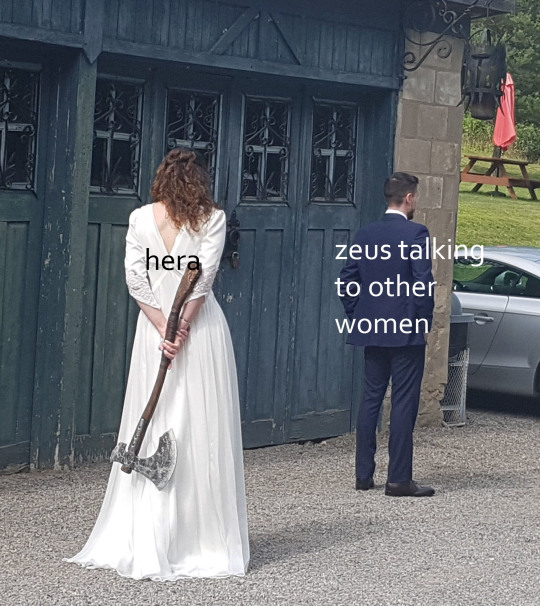





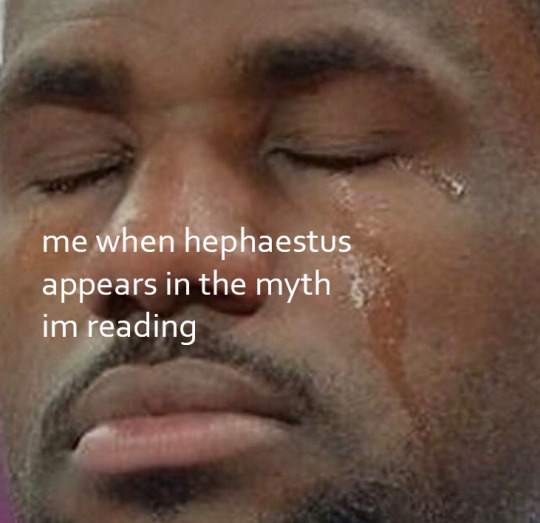



greek mythology | cursed images
81K notes
·
View notes
Text
half of me finishes a book within 6-12 consecutive hours and the other half of me takes roughly six months.
33K notes
·
View notes
Text
Story Structures for your Next WIP
hello, hello. this post will be mostly for my notes. this is something I need in to be reminded of for my business, but it can also be very useful and beneficial for you guys as well.
everything in life has structure and storytelling is no different, so let’s dive right in :)
First off let’s just review what a story structure is :
a story is the backbone of the story, the skeleton if you will. It hold the entire story together.
the structure in which you choose your story will effectively determine how you create drama and depending on the structure you choose it should help you align your story and sequence it with the conflict, climax, and resolution.
1. Freytag’s Pyramid
this first story structure i will be talking about was named after 19th century German novelist and playwright.
it is a five point structure that is based off classical Greek tragedies such as Sophocles, Aeschylus and Euripedes.
Freytag’s Pyramid structure consists of:
Introduction: the status quo has been established and an inciting incident occurs.
Rise or rising action: the protagonist will search and try to achieve their goal, heightening the stakes,
Climax: the protagonist can no longer go back, the point of no return if you will.
Return or fall: after the climax of the story, tension builds and the story inevitably heads towards…
Catastrophe: the main character has reached their lowest point and their greatest fears have come into fruition.
this structure is used less and less nowadays in modern storytelling mainly due to readers lack of appetite for tragic narratives.
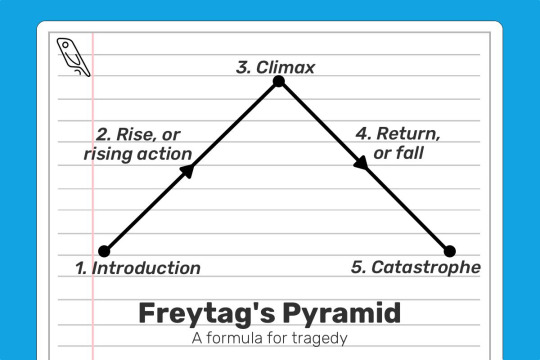
2. The Hero’s Journey
the hero’s journey is a very well known and popular form of storytelling.
it is very popular in modern stories such as Star Wars, and movies in the MCU.
although the hero’s journey was inspired by Joseph Campbell’s concept, a Disney executive Christopher Vogler has created a simplified version:
The Ordinary World: The hero’s everyday routine and life is established.
The Call of Adventure: the inciting incident.
Refusal of the Call: the hero / protagonist is hesitant or reluctant to take on the challenges.
Meeting the Mentor: the hero meets someone who will help them and prepare them for the dangers ahead.
Crossing the First Threshold: first steps out of the comfort zone are taken.
Tests, Allie, Enemies: new challenges occur, and maybe new friends or enemies.
Approach to the Inmost Cave: hero approaches goal.
The Ordeal: the hero faces their biggest challenge.
Reward (Seizing the Sword): the hero manages to get ahold of what they were after.
The Road Back: they realize that their goal was not the final hurdle, but may have actually caused a bigger problem than before.
Resurrection: a final challenge, testing them on everything they’ve learned.
Return with the Elixir: after succeeding they return to their old life.
the hero’s journey can be applied to any genre of fiction.

3. Three Act Structure:
this structure splits the story into the ‘beginning, middle and end’ but with in-depth components for each act.
Act 1: Setup:
exposition: the status quo or the ordinary life is established.
inciting incident: an event sets the whole story into motion.
plot point one: the main character decided to take on the challenge head on and she crosses the threshold and the story is now progressing forward.
Act 2: Confrontation:
rising action: the stakes are clearer and the hero has started to become familiar with the new world and begins to encounter enemies, allies and tests.
midpoint: an event that derails the protagonists mission.
plot point two: the hero is tested and fails, and begins to doubt themselves.
Act 3: Resolution:
pre-climax: the hero must chose between acting or failing.
climax: they fights against the antagonist or danger one last time, but will they succeed?
Denouement: loose ends are tied up and the reader discovers the consequences of the climax, and return to ordinary life.
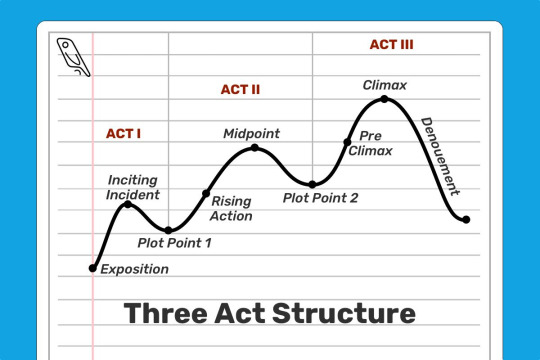
4. Dan Harmon’s Story Circle
it surprised me to know the creator of Rick and Morty had their own variation of Campbell’s hero’s journey.
the benefit of Harmon’s approach is that is focuses on the main character’s arc.
it makes sense that he has such a successful structure, after all the show has multiple seasons, five or six seasons? i don’t know not a fan of the show.
the character is in their comfort zone: also known as the status quo or ordinary life.
they want something: this is a longing and it can be brought forth by an inciting incident.
the character enters and unfamiliar situation: they must take action and do something new to pursue what they want.
adapt to it: of course there are challenges, there is struggle and begin to succeed.
they get what they want: often a false victory.
a heavy price is paid: a realization of what they wanted isn’t what they needed.
back to the good old ways: they return to their familiar situation yet with a new truth.
having changed: was it for the better or worse?
i might actually make a operate post going more in depth about dan harmon’s story circle.
5. Fichtean Curve:
the fichtean curve places the main character in a series of obstacles in order to achieve their goal.
this structure encourages writers to write a story packed with tension and mini-crises to keep the reader engaged.
The Rising Action
the story must start with an inciting indecent.
then a series of crisis arise.
there are often four crises.
2. The Climax:
3. Falling Action
this type of story telling structure goes very well with flash-back structured story as well as in theatre.
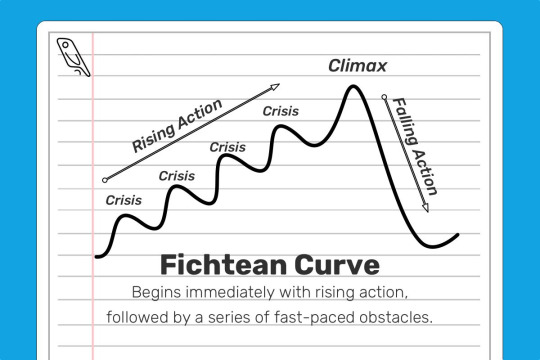
6. Save the Cat Beat Sheet:
this is another variation of a three act structure created by screenwriter Blake Snyder, and is praised widely by champion storytellers.
Structure for Save the Cat is as follows: (the numbers in the brackets are for the number of pages required, assuming you’re writing a 110 page screenplay)
Opening Image [1]: The first shot of the film. If you’re starting a novel, this would be an opening paragraph or scene that sucks readers into the world of your story.
Set-up [1-10]. Establishing the ‘ordinary world’ of your protagonist. What does he want? What is he missing out on?
Theme Stated [5]. During the setup, hint at what your story is really about — the truth that your protagonist will discover by the end.
Catalyst [12]. The inciting incident!
Debate [12-25]. The hero refuses the call to adventure. He tries to avoid the conflict before they are forced into action.
Break into Two [25]. The protagonist makes an active choice and the journey begins in earnest.
B Story [30]. A subplot kicks in. Often romantic in nature, the protagonist’s subplot should serve to highlight the theme.
The Promise of the Premise [30-55]. Often called the ‘fun and games’ stage, this is usually a highly entertaining section where the writer delivers the goods. If you promised an exciting detective story, we’d see the detective in action. If you promised a goofy story of people falling in love, let’s go on some charmingly awkward dates.
Midpoint [55]. A plot twist occurs that ups the stakes and makes the hero’s goal harder to achieve — or makes them focus on a new, more important goal.
Bad Guys Close In [55-75]. The tension ratchets up. The hero’s obstacles become greater, his plan falls apart, and he is on the back foot.
All is Lost [75]. The hero hits rock bottom. He loses everything he’s gained so far, and things are looking bleak. The hero is overpowered by the villain; a mentor dies; our lovebirds have an argument and break up.
Dark Night of the Soul [75-85-ish]. Having just lost everything, the hero shambles around the city in a minor-key musical montage before discovering some “new information” that reveals exactly what he needs to do if he wants to take another crack at success. (This new information is often delivered through the B-Story)
Break into Three [85]. Armed with this new information, our protagonist decides to try once more!
Finale [85-110]. The hero confronts the antagonist or whatever the source of the primary conflict is. The truth that eluded him at the start of the story (established in step three and accentuated by the B Story) is now clear, allowing him to resolve their story.
Final Image [110]. A final moment or scene that crystallizes how the character has changed. It’s a reflection, in some way, of the opening image.
(all information regarding the save the cat beat sheet was copy and pasted directly from reedsy!)
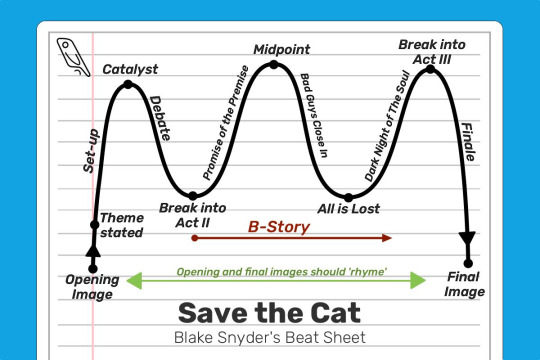
7. Seven Point Story Structure:
this structure encourages writers to start with the at the end, with the resolution, and work their way back to the starting point.
this structure is about dramatic changes from beginning to end
The Hook. Draw readers in by explaining the protagonist’s current situation. Their state of being at the beginning of the novel should be in direct contrast to what it will be at the end of the novel.
Plot Point 1. Whether it’s a person, an idea, an inciting incident, or something else — there should be a “Call to Adventure” of sorts that sets the narrative and character development in motion.
Pinch Point 1. Things can’t be all sunshine and roses for your protagonist. Something should go wrong here that applies pressure to the main character, forcing them to step up and solve the problem.
Midpoint. A “Turning Point” wherein the main character changes from a passive force to an active force in the story. Whatever the narrative’s main conflict is, the protagonist decides to start meeting it head-on.
Pinch Point 2. The second pinch point involves another blow to the protagonist — things go even more awry than they did during the first pinch point. This might involve the passing of a mentor, the failure of a plan, the reveal of a traitor, etc.
Plot Point 2. After the calamity of Pinch Point 2, the protagonist learns that they’ve actually had the key to solving the conflict the whole time.
Resolution. The story’s primary conflict is resolved — and the character goes through the final bit of development necessary to transform them from who they were at the start of the novel.
(all information regarding the seven point story structure was copy and pasted directly from reedsy!)
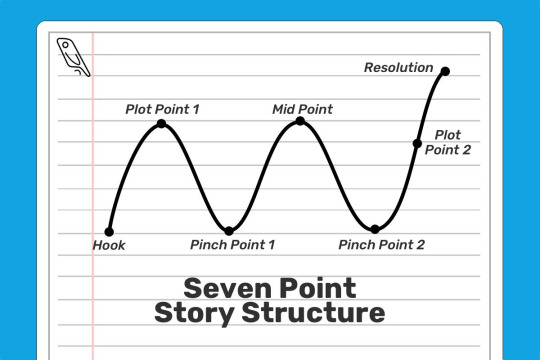
i decided to fit all of them in one post instead of making it a two part post.
i hope you all enjoy this post and feel free to comment or reblog which structure you use the most, or if you have your own you prefer to use! please share with me!
if you find this useful feel free to reblog on instagram and tag me at perpetualstories
Follow my tumblr and instagram for more writing and grammar tips and more!
13K notes
·
View notes
Text

heyy! with school starting again, I decided to combine a lot of helpful post, so you can rock the new school year! I’ve spent quite some time going through different masterposts and the ones i included here are very helpful resources. good luck for the new school year! <3
STUDYING
study effectively
revise method
take a break
study journal
planning the perfect study schedule
all the things that got me studying after one year of living through tv-show characters and wasting time on youtube (be honest, we all need this)
how to memorize
flashcards
preparing for exams
how to pull an all-nighter (but pls only do this in extreme situations)
how i study
SCHOOL
how to wear what you want to school
first day of class
emergency kit
list of tips (this is super helpful)
test taking tips
help! i hate my teacher
how to annotate
NOTE TAKING
how to take notes from a textbook
tips
what to do when you ruined your notes
upgrade your notes
ESSAYS
five paragraph essay
how to write 20 pages
battling essays
STATIONERY
essentials
backpack buying guide
cute and cheap stationery
LANGUAGES
tips + resources
different ways to learn a language
how to learn a language by doing nothing
SELF CARE / PERSONAL
self care
some advice
back to school glow up
morning routine
night routine
skin care
stress route
mental health tips
school and heartbreak
tests for when you don’t know what to do with your life
burnout - a guide for students
FOOD
study foods
ideas
easy recipes for students
ORGANIZATION
organize & refresh your phone and laptop https://youtu.be/3b00aqUqoZI
staying organized
guide to bullet journals
bujo for students
PRODUCTIVITY
beat procrastination
how to increase productivity
sort out tasks
self-discipline
MOTIVATION
study moods
motivation
gentle reminder
how to motivate yourself to start studying
MUSIC
mildliner inspired study playlists
best spotify playlists and albums for your study session
playlists for different moods
study music
PRINTABLES
binder covers
grade tracker
study pack (task tracker, formula list, habit tracker, task tracker)
go to sleep
back to school kit (class data, study group sheet, supplies list)
APPS
google chrome extensions
my favorite study apps
apps for students
#study masterpost#masterpost#resources#study tips#othertips#studyblr#back to school#studying#stationery
10K notes
·
View notes
Text
STUDY TIPS: QUARANTINE EDITION *✭˚・゚✧*・゚*✭˚・゚✧*・゚*
Studying while in quarantine has been a bit of a change since we can’t go to classes / the library etc so here are some tips / things I’ve realised:
Drink water instead of coffee. Bonus if the water is cold. It keeps you alert yet more focused than caffeine.
Don’t set weekly goals. A whole week at home means your goals will be pushed aside in favour of animal crossing or netflix. Set three-day goals instead.
Have a clear sleep schedule. If you’re rolling out of bed at 12pm, you’ll feel less motivated to get some studying done. Maybe wake up at 9.30, and sleep at 11. Do what works for you.
Have a plan. Know your approach to a task before you do it. Don’t just mindlessly stare at your laptop or worksheet before doing something or you’ll be sat there for hours.
Summarise the concept in your own words. It’s the key concept of note-taking - you understand things more and you haven’t just copied down textbook babble you don’t understand. If you can’t explain something in simple terms, you don’t understand the concept.
Don’t let the “studyblr aesthetic” fool you. Studying doesn’t have to be pretty. The notes you see on social media of pretty notes have been rewritten and organised after the initial scribble on lined paper. Let your notes be messy (as long as they’re readable) and if you want to pretty things up later, go ahead!
Don’t throw away scrap paper you’ve used for working out - staple it to your book, add it to your folder - if you ever come across that problem again you have a step-by-step way of working it out.
Understand that if you’re at a zero, you won’t go to 100 in a couple of days. First, you’ll need to reach 20, then from 20 to 50, and then from 50 to 80. Nobody is 100 everyday. Nobody can get to 100 overnight. Give yourself time.
Spend time relaxing. You need to have ‘you time’ every single day. Watch netflix, binge watch disney, play animal crossing, sleep for 10 hours. You need to spend some time on you, doing what you love, to make you studying effective.
Once you’re on a roll and need a way to stay on track, start writing down your studying hours. Maybe make a schedule. If you studied for 6 hours yesterday, tell yourself you need to at least 80% of that.
Don’t have a zero day, try do a little bit each day, even if you feel awful and can only do 20 minutes.
Be kind to yourself. We’re living in uncertain times. We don’t know what will happen next. Take care of yourself, practise some self care, and know that even if you’re getting an hour of studying done a day, that’s still a huge accomplishment.
#studyblr#study#new studyblr#student#study blog#studyspo#whatsonmydesk#studyspiration#likeimstudying#study tricks
640 notes
·
View notes
Text

232 notes
·
View notes


